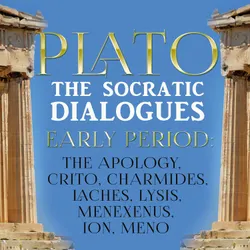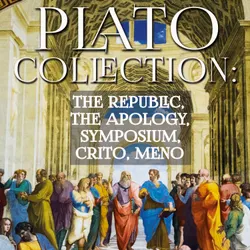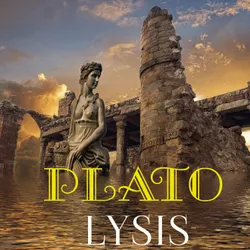Theaetetus Plato - Perception, memory, truth, and knowledge all play major roles in this dialogue. What is remarkable about Platos treatment of those ideas is how contemporary are both the questions and the answers he puts in the mouths of his characters. Socrates is adamant in asserting that he does not know the answers but that his function is simply to help formulate and critically examine the doctrines presented by others. While he was still alive, the great sophist Protagoras was a friend of Theodorus who has subsequently given up abstract philosophical inquiry and now teaches mathematics, astronomy, and logic to young people such as Theaetetus, the most gifted student he has ever encountered. Socrates examines young Theaetetus to determine whether or not what he has learned from Theodorus provides wisdom and truth. The analogies and metaphors that emerge during their conversation foreshadow the theories of mind favored by contemporary cognitive scientists, but Platos dialogue also raises serious doubts about the cogency of those explanations.

Library of Masterpieces - 100 Books to Read in a Lifetime
illiam Shakespeare, Fyodor Dostoevsky, Louisa May Alcott, Miguel de Cervantes, John Milton, Jane Austen, Charlotte Brontë, Emily Brontë, Anne Brontë, William Makepeace Thackeray, George Eliot, Charles Dickens, Thomas Hardy, Jonathan Swift, Daniel Defoe, Joseph Conrad, Robert Louis Stevenson, Mary Shelley, Bram Stoker, Arthur Conan Doyle, Wilkie Collins, Oscar Wilde, T. S. Eliot, D. H. Lawrence, James Joyce, Virginia Woolf, E. M. Forster, Evelyn Waugh, Aldous Huxley, George Orwell, H. G. Wells, Lewis Carroll, Frances Hodgson Burnett, Kenneth Grahame, C. S. Lewis, Malcolm Lowry, Ford Madox Ford, Mark Twain, Jack London, Herman Melville, Ernest Hemingway, Jack Kerouac, Nathaniel Hawthorne, Edith Wharton, Walt Whitman, Kate Chopin, Harriet Beecher Stowe, Neale Hurston, Richard Wright, Raymond Chandler, Dashiell Hammett, F. Scott Fitzgerald, John Steinbeck, William Faulkner, Margaret Mitchell, Sylvia Plath, Carson McCullers, L. Frank Baum, L. M. Montgomery, Leo Tolstoy, Ivan Turgenev, Nikolai Gogol, Johann Wolfgang von Goethe, Friedrich Nietzsche, Thomas Mann, Franz Kafka, Erich Maria Remarque, Albert Camus, Marcel Proust, Jules Verne, Victor Hugo, Gustave Flaubert, Stendhal, Alexandre Dumas, Henrik Ibsen, Rudyard Kipling, Homer, Sophocles, Virgil, Laozi, Sun Tzu, Plato, Marcus Aurelius, Dante Alighieri, Niccolò Machiavelli
book
10 Masterpieces You Have to Read Before You Die, Vol.5 : The Odyssey, The Republic, Meditations, The Divine Comedy, Faust and others
Homer, Plato, Aristotle, Marcus Aurelius, Niccolo Machiavelli, Dante Alighieri, Johann Wolfgang Von Goethe, Leo Tolstoy
audiobookbook
Plato: The Complete Works (31 Books) : Timeless Philosophical Masterpieces
Plato, Redhouse
book
Plato: The Complete Works (31 Books) : The Definitive Collection of Philosophical Classics
Plato, Moon Classics
book
Plato: The Complete Works (31 Books) : The Definitive Collection of Philosophy's Greatest Dialogues
Plato, Classics for all
book
25+ The Big Book of Ancient Classics : The Odyssey by Homer, Meditations by Marcus Aurelius, The Republic by Plato, Poetics by Aristotle and others
Aristotle, Aeschylus, Marcus Aurelius, Euripides, Hesiod, Homer, Plato, Sappho, Sophocles
audiobook
Alcibiades 1
Plato
audiobook
10 Masterpieces You Have To Listen To Before You Die: Vol. 1
Lewis Carroll, Joseph Conrad, Miguel de Cervantes, F. Scott Fitzgerald, Edgar Allan Poe, Franz Kafka, Jack London, Sun Tzu, H.G. Wells, Plato
audiobook
Apologie de Socrate
Plato
audiobook
The Socratic Dialogues. Early Period : The Apology, Crito, Charmides, Laches, Lysis, Menexenus, Ion, Meno
Plato
audiobook
Plato Collection : The Republic, The Apology, Symposium, Crito, Meno
Plato
audiobook
Lysis
Plato
audiobookbook
